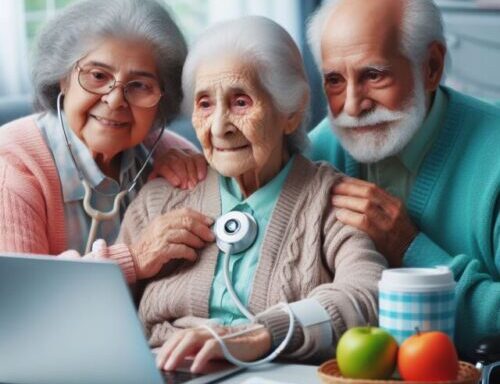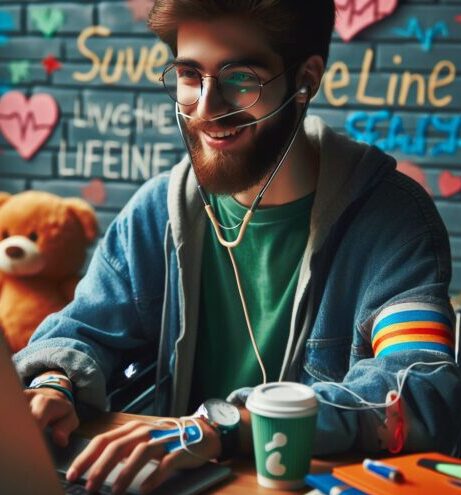
We live in an era where digital identification isn’t just a convenience; it’s a cornerstone of modern existence. From the youngest tech enthusiast to the most senior citizen, the need for a digital ID spans every age and ability.
A digital ID that can:
- Connect people all over the world
- Provide support and immediate assistance
- Prevent the most tragic outcomes by ensuring everyone is part of a supportive network
- be a social hub where you’re never alone
Such a platform isn’t simply about verification but providing a secure key to essential services. Whether healthcare, social benefits, or emergency services, digital IDs offer quick, reliable access, especially for those who may otherwise be excluded.
Perhaps you’ve thought about what might happen if the world faced another significant crisis.
Would you have secure, reliable access to resources like food, medical care, or essential human interaction?
The answer for many, particularly the vulnerable, hinges on having a digital ID.
Without overstating the urgency, it’s clear. In an unpredictable world, staying connected through a digital ID is not merely a matter of convenience but a necessity, bridging the gap between isolation and community.
Internet As Lifeline: More Than Just a Resource
The internet is no longer a luxury. It’s a necessity, a lifeline that connects us to a world of resources, especially during tough times like wars, natural disasters, and pandemics.
It’s where you can find immediate help, access essential services, and stay in touch with loved ones, all with the click of a button. But this lifeline is only available to those with a digital ID, a virtual ‘key’ to the online world.
During crises, the internet’s speed and convenience can be the difference between getting help in time or not. I can’t overstate the importance of digital identity during such moments. It does not matter if you’ll need it, but when.
The grand scale of online resources can support you in ways traditional methods cannot match. Quick access to emergency contacts, relief resources, financial assistance, and healthcare information are just a few taps away when you’re plugged into the digital grid.
Your digital ID is your passport to this realm of essential services. It authenticates your identity and ensures you can perform transactions, access medical records, and engage in community support networks safely and securely. Without it, you could miss out on critical support and tools for survival. I want you to imagine a scenario where physical mobility issues might restrict you during a calamity. Still, thanks to your digital identity, assistance is at hand through your online connections.

Bridging the Digital Divide: Inclusion for Every Age and Ability
Imagine a world where every person, regardless of age or ability, has seamless access to the digital realm.
This is a world I believe we can achieve and must strive for.
An inclusive digital society is not a luxury; it’s a requirement in an age where information, services, and connections increasingly move online. From making appointments with healthcare providers to accessing educational resources, a digital ID quickly becomes the gateway to a whole life.
The disparity between the digitally literate and those who are not is a divide threatening to leave many in our community on the sidelines of progress. We can’t let this happen to the elderly, the infirm, or the disabled. A concerted effort to include every person is not just an act of compassion; it’s common sense. The knowledge and participation of every individual enrich our collective online experience.
Elderly individuals, often perceived as resistant or unable to learn new technology, mustn’t be overlooked. Many seniors have shown the capability and enthusiasm to engage with the digital world when given the chance. With proper support and resources, we can paint a different future for our beloved elderly population, one in which they’re active members of the digital landscape.
It’s heartbreaking to consider that in Japan, in recent years, some have taken their own lives due to overwhelming work pressures while others have died alone, their absence unnoticed for too long.
A vibrant digital presence, bolstered by a digital ID, could be the social lifeline that deepens their connection to the world, ensuring nobody is genuinely isolated. Getting everyone online can become a matter of overall well-being.
Programs tailored to meet the needs of older adults or those with disabilities are integral. These programs can facilitate acquiring digital skills and make technologies more accessible. Touchscreen devices with intuitive interfaces, voice-activated software, and virtual assistants can make a difference in how the differently-abled connect with society.
As we pave this digital pathway, it must lead to meaningful outcomes. It’s about bringing the older generation online and reshaping the narrative around ageing and technology. We must challenge the stereotype that older people are not suited for the digital world. By doing so, we say yes to diversity, shared knowledge, and a more inclusive future.
Unlocking Elder Wisdom: Digital Enterprises for the Aged
Imagine the wealth of experience and wisdom amassed over decades, lying just beyond the digital divide. This is the untapped resource of an entire generation often overshadowed in the online world. I see it as not just an opportunity but a necessity for seniors to step into the digital limelight and harness their vast knowledge to contribute to the global community. This goes beyond staying relevant; it becomes a means to stave off the shadows of isolation and dementia.
Research has shown that social interaction can play a pivotal role in delaying the onset of dementia. Adapting to the digital age allows this interaction to occur despite physical limitations or distance. By engaging in online business, seniors foster these needed social connections and pass on their valuable insights and life lessons to a broader audience.
This can be a cornerstone in making the internet more inclusive and richer in content and perspective.
And there’s no shortage of avenues for the 65+ age group to make their mark. Whether sharing recipes passed down through generations, offering virtual consulting based on a retired professional’s expertise, or crafting tailored goods for sale, the possibilities are vast and varied. An online business can provide a stimulating challenge and a sense of purpose and achievement.
How do we bridge this gap and bring these potential digital entrepreneurs into the fold? It begins with empowerment—ensuring access and education to leverage technology effectively. Programs and platforms designed with seniors’ user experience in mind could pave the way for their entry into the online business landscape. And that’s where First-Hand Life comes in.
First-Hand Life: Gateway to the Digital World
Entering the digital age might seem daunting, especially if typing a URL feels like learning a new language. But the good news is: ‘First-Hand Life’ is a platform designed to ease this transition. It’s dedicated to ensuring that everyone, regardless of their age or abilities, can learn the skills needed to navigate the digital world confidently.
It doesn’t matter if you’re starting out or have dabbled in digital spaces before; the platform offers easy-to-follow step-by-step guidance.
Think of it as your personal mentor, slowly but surely walking you through what it means to be part of the online community.
Whether:
- setting up an email account
- learning to shop online
- understanding how to stay safe online
‘First-Hand Life’ covers it all. The learning curve doesn’t have to be steep and frightening. With the right support, it can be a gradually ascending path leading to a broad horizon of possibilities.
The stories of transformation in ‘First-Hand Life’ are particularly inspiring.
They show that personal growth doesn’t stop at any age. Users who started with minimal digital exposure recount their journeys to becoming proficient users, finding a new sense of purpose and connection. It’s a testament that joining the global community online is never too late.
Wealthy Affiliate: Your Technical Ally in the Online Odyssey
I’ve observed firsthand how stepping into the online arena can be daunting, especially if you’re not well-versed in the digital world. Considering the complexities of website creation and maintenance, feeling overwhelmed is understandable. But here’s the good news: you don’t have to tackle it alone. Wealthy Affiliate emerges as a crucial partner, transforming what might seem like an insurmountable challenge into a manageable one.
Wealthy Affiliate stands out for its robust platform, which is designed to handle the technicalities of website building. This means that you can access tools that simplify the process if you’re experiencing the internet for the first time or in your golden years and want to share your knowledge.
Their services are swift, reliable, and tailored to fit varying levels of technical expertise. You could have your online presence set up in no time without the need to delve into perplexing tech jargon.
Wealthy Affiliate is more than just a service provider; it is a vibrant community. It’s a place of social interaction, rich with opportunities for learning and exchanging wisdom. Being a part of such a community can significantly reduce feelings of isolation and boredom often experienced by the elderly. Every question is met with expert advice and encouragement, offering a fertile ground for personal and business growth.
You might wonder about the actual difference this can make. Imagine harnessing years of wisdom and sharing it with the world while creating new connections and finding purpose.
That’s exactly what Wealthy Affiliate facilitates. It’s not just about building websites; it’s about nurturing connections, cultivating businesses, and creating a more inclusive internet.
As I conclude, remember that embracing digital skills and integrating into the online community is not a matter of if but when.
Whether out of necessity or curiosity, having a digital ID and the savvy to use it is becoming integral to modern life. Wealthy Affiliate is ready to be your ally, ensuring that no matter your age or previous experience with technology, you won’t be left behind. I encourage you to take that step, join the community, and watch your digital journey unfold into success and fulfilment.

You can read more about Wealthy Affiliate in my thorough Review here.

It’s amazing how the digital world has completely taken over this world, and if you don’t familiarize yourself with it all, you certainly are getting left behind. I’m only 47 and get overwhelmed by technology, computers in particularly, all the time. It’s great that there are programs to help people like myself get somewhat caught up in the digital landscape, as it does feel very daunting to so many of us.
Hi again Mike,
This is good to know. Thanks so much for sharing.
Yes, First-Hand Life is determined to include everyone on the Internet and, in partnership with WA, hone everyone’s skills!! It’s essential, and I feel passionate about including absolutely everyone!!
It may help to look at the 5-Step Preliminary Guide, which focuses on developing the right mindset, terminology, etc., to develop the skills everyone needs on Wealthy Affiliate.
You no longer need to feel daunted because I can help! I’ve been a Mindful Educator for decades, so it comes naturally to me.
Blessings and Success.
Linden
Hi Linden,
In your article, you highlight how crucial digital IDs are to guarantee that people can access resources and services, particularly in times of emergency. It highlights how digital identification can close gaps between various social groups, including the elderly, by giving them safe access to social services, healthcare, and other resources, thereby reducing isolation.
We need to think carefully about balancing privacy and data security concerns with the requirement for digital IDs for all. Then a question pops into our minds: What measures can guarantee that the most susceptible groups are not excluded from the digital divide?
Great comment, Sara. Yes, privacy and data security are issues that the powers that be are currently thoroughly considering. And I am working to incorporate this into my site.
To ensure inclusion, I will work with public service groups and offer the mindset changes I suggest on my site, 5-Steps to an Online Business. I am in the process of setting up as a coach to work with groups on Zoom and as a one-on-one coach to guide these minority special cases.
Please subscribe to the site to receive more information as I get it.
Blessings and Success.
Linden
Wow, this article really highlights the importance of digital identification in today’s world. It’s amazing to see how something as simple as a digital ID can become a lifeline during times of crisis. And the fact that everyone can benefit from this is really cool and feels like the way of the future – accessibility is definitely most important when it comes to new technology. Do you think the widespread adoption of digital identification could also bring about any potential challenges or concerns, such as privacy or security? It seems as technology improves, so does the surveillance in our lives. But maybe that’s worth the tradeoff?
Hello Chase, Thanks for your appreciation. Yes, you’re right: this is the way of the future. The Internet is perfect for everyone, no matter their status, and there is so much technology to help disabled people access it now.
Yes, I think there may be concerns as with anything new and universal. However, if technology can get everyone online, it can also implement the necessary safeguards. The main thing is that the Internet is Inclusive and serves the global community.
Surveillance is gradually coming under control with all the recent scares and laws enforced, and I think it’s good that governments can keep tabs on their ageing/disadvantaged population as long as it’s controlled by an independent watchdog. We have to ensure that the Internet is a wonderful place for everyone in the future: it is our future, in fact!!
You may be interested in the 5-step Preliminaries, too. This prepares marginalised communities to step into the limelight of the Internet. Keep in touch with my latest blogs as they’re published if yo uwant to know more on the homepage: https://first-hand-life.com.
Blessings and Success.
Linden
Hey Linden,
first of all I really like your article and now I feel save to start my own Online-Business! Thank you for your helpfull article!
I have a question aswell:
What specific strategies or resources can be implemented to ensure that elderly individuals with limited technological proficiency can effectively utilize digital IDs and access essential online services during crises or emergencies?
Hi Matthias,
Thank you. I’m so glad you feel inspired to start your own business. If you need any help, please don’t hesitate to ask. You might also like to try these 5-step Preliminaries to Launching Your Own Internet Business. Hopefully, this will give you even more confidence.
Perhaps you have been living a second-hand life? So, it’s time to step into the limelight and live First-Hand.
Your question: Well, they need some guidance on mindset, terminology, etc., which I’ve provided in the 5-step guide above. I’m creating more posts about digital skills as quickly as I can because I feel there is a real need. Also, these two articles may explain more: Starting A New Life With An Internet Business and Welcome to the rest of your life!
I think everyone can learn these skills, and there are certain PC aids now as well for the hearing/visually impaired. Technology has never been so helpful. I’ll be posting on these soon, so if you’re interested, sign up to receive my latest blog posts. You can do that on the home page: https://first-hand-life.com.
Hope that helps.
Keep in touch.
Blessings and Success
Linden